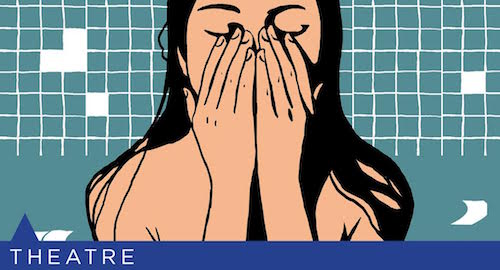
On Sunday March 6th 2016, the Harold Green Jewish Theatre presents a dramatic reading of Mikveh, by Hadar Galron, at the Toronto Centre for the Arts. When Mikveh premiered in Israel in 2004, it was met with wide acclaim and some controversy. The show throws open the doors to not only a very private ritual in the Orthodox Jewish community (a mikveh is a bath used for ritual immersion, often used by women to regain purity after menstruation or childbirth), but also secrets and scandals that echo real ones faced by the community: felt, but rarely discussed.
The play, winner of Production of the Year at the Israeli Theatre Academy Awards in 2004, will feature Rosa Laborde, Theresa Tova, Sochi Fried, Maria Ricossa, Tal Gottfried, Carly Street, Liza Balkan, and Maaor Ziv as eight women exploring the roles of gender, religion and a nascent feminism in their tightly-controlled world.
We asked David Eisner, Assistant Director of the Harold Green, and actress Theresa Tova, who plays Shoshana-Dvora, the senior bath attendant, some questions about what audiences might expect to discover inside the bathhouse’s walls.
Can you briefly describe your show and how it was inspired?
David: On the basic story-level, Mikveh is about women living in an orthodox community, their stories and secrets intertwining. Eight women, eight stories and one wave of courage that breaks the closed community’s codes — bringing them all together.
The writer of the play, Hadar Galron, grew up in London and then moved to Israel. She also grew up in an orthodox home. Although she has said the play is not autobiographical, it is based on true stories. I think what the playwright wanted to speak about is the status of woman from all walks of life, using the specifics of this play as just a tool.
What can the audience expect?
David: The audience can expect to see eight brilliantly talented women perform a provocative play that takes place in a location they are generally not exposed to.
The play was reportedly quite controversial when it premiered in Israel. Could you speak to the controversy, and the value of the play in presenting these potentially uncomfortable topics?
David: What any good play does is raise questions, and sometimes push people’s “buttons”. And while the device the playwright uses in this play is the mikveh in an Orthodox community, I believe the questions raised in this play are about gender equality in all societies. I think what might make people uncomfortable comes from challenging the status quo or tradition, when it is in conflict with the struggles of gender equality today. I know this play has resonated strongly with a lot of people, and is now being made into a film.
How does a dramatic reading of this play differ from a full production, in the process and the final experience?
Theresa: At the beginning of every fully rehearsed and staged production, actors sit around a table and read the script aloud for the entire creative team. Before the addition of elements that include memorization, staging, lighting, costumes, sets and props, the actors have complete freedom to explore the language and ideas offered to them by the playwright. There are no limitations to the exploration.
That first reading is often magical and the next three weeks of rehearsal are spent trying to find the way back to the honesty of those initial instincts.
Dramatic readings allow audiences a glimpse into the creative process. We actors are in uncharted territory and we learn what the play is about by the intimate exchange we have with our first-ever audience.
What is it like working with an all-female cast in conjunction with the themes of the show, and the ritual it presents?
Theresa: Women struggle today to have gender parity in our world and in our creative industry, just like the women of Mikveh struggled to have control in their world. There are fewer opportunities for women than men. There are fewer female artistic directors, fewer women playwrights and therefore fewer stories about women and fewer roles for us to play, especially as we age. Mikveh is one of those rare opportunities to gather together a strong cast of women protagonists. I’m excited to explore the world of Mikveh, a world hidden to most secular Jews, with this talented group of women.
The mikveh is a world my great grandmother’s generation knew. My grandmother and mother rejected its ritual, and yet I am fascinated by it.
Details:
- The reading of Mikveh will take place on Sunday, March 6th at 2:00PM in The Gallery Lounge, Toronto Centre for the Arts (5040 Yonge Street)
- Admission is free, but reservations are required by calling (416) 932-9995, ext. 224
Promotional image provided by the company
